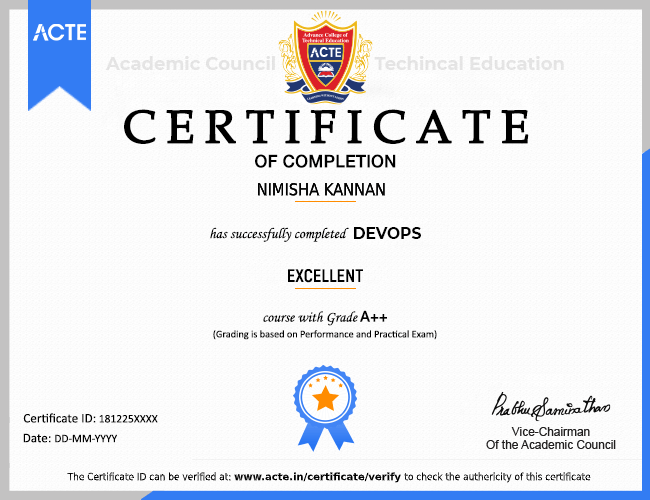Learn (CI with Jenkins + Ansible Configuration + Docker Containerization + Kubernetes Orchestration + Prometheus & Grafana Monitoring) at ₹25,960 - Only. Grab now
Devops Course with 100% Job Guarantee
- The Cost of DevOps Courses is Reasonable.
- Training for Both New and Experienced Students.
- Practical Experience is the Main Focus of the Training.
- More Than 10+ Years of Experience as an Expert DevOps.
- Students Get Access to Materials, Videos, and Other Resources.
) 3K+
3K+
-
Course 1 Continuous Integration using Jenkins
-
Course 3 Containerization using Docker
-
Course 4 Orchestration using Kubernetes
-
Hands-on Project (CI/CD Pipeline, Infrastructure Automation, Monitoring Dashboard)
-
Job Preparation (Aptitude, Resume Preparation, Mock Interview)
Our Top Placement Companies











Key Highlights


Placement Assistance

Exclusive access to ACTE Job portal

Mock Interview Preparation

1 on 1 Career Mentoring Sessions

Career Oriented Sessions

Resume & LinkedIn Profile Building
Curriculum Designed By Experts
Navigating Success: Custom Curriculum for Future-Ready Achievement
Industry Oriented Curriculum
An exhaustive curriculum designed by our industry experts which will help you to get placed in your dream IT company
-
30+ Case Studies & Projects
-
9+ Engaging Projects
-
10+ Years Of Experience
DevOps Training Projects
Become a DevOps Expert With Practical and Engaging Projects.
-
Practice essential Tools
-
Designed by Industry experts
-
Get Real-world Experience
Static Website Deployment
Build a static website, employ Git for version control, and establish a CI/CD pipeline to automatically deploy updates to hosting services like Netlify or GitHub Pages.
Dockerizing a Basic Application
Dockerize a simple application using a Dockerfile, and verify its functionality by deploying and running the container on your local environment.
Automated Backup Script
Create a backup script for specified files, schedule automated runs using cron jobs (Linux) or Task Scheduler (Windows), and store backups in a designated directory.
Configuration Management with Ansible
Develop Ansible playbooks to automate the configuration and provisioning of web servers, while utilizing Ansible roles for modular and reusable system configurations on remote servers.
CI/CD Pipeline for a Web Application
Establish a CI/CD pipeline for web apps with Jenkins, GitLab CI/CD, or Travis CI, covering build, test, and deploy stages, and integrating automated unit and integration tests.
Container Orchestration with Kubernetes
Deploy and optimize a microservices app on Kubernetes, leveraging features like rolling updates and ingress controllers for enhanced container orchestration.
Microservices Architecture and DevOps
Design complex microservices, establish CI/CD pipelines, and bolster with service discovery, load balancing, and monitoring via Istio or Linkerd.
Infrastructure as Code (IaC) with Terraform
Create a multi-tier infrastructure (e.g., VPC, EC2, RDS) with Terraform, use modular approaches, and efficiently manage state with remote backends.
Continuous Monitoring and Alerting
Establish robust monitoring and alerts with Prometheus and Grafana, featuring custom dashboards for metrics and configured alert rules with notifications.
20+ Skill to Master
Puppet and Ansible
Docker Swarm
Terraform
Kubernetes
Git
DevOps
Jenkins
Maven
Nagios
12+ Tools to Master







DevOps Certification

DevOps certifications can enhance your career prospects by showcasing your proficiency in DevOps practices and tools. They are recognized by employers and can open doors to job opportunities in DevOps and related fields.
Some of the most recognized DevOps certifications include:
Prerequisites vary depending on the certification. Generally, you should have a basic understanding of software development, IT operations, and cloud computing concepts. Some certifications may require specific training or work experience.
Yes, there are certifications designed for different skill levels:
You can take most certification exams at authorized testing centers or online through remote proctoring. Check with the certification provider for specific details.
The cost varies depending on the certification and the provider. Be prepared to pay for study materials, training programs, and exam fees, which can range from hundreds to thousands of dollars.
Certification validity varies by provider. Some certifications are valid for a lifetime, while others require renewal every few years through continuing education or re-examination.
DevOps certifications are primarily designed for technical roles such as engineers and administrators. However, understanding DevOps principles can be beneficial for non-technical roles involved in software development and delivery, such as project managers and product owners.
Job Assistant Program
Your Intent To Master Next Level Skills Are Appreciated
We Take Pride In Being Part Of 4 Lakh Plus Career Transition Worldwide
Our Requirement Strong
-
Course Completion
Get hands-on training from experts.
-
Resume Building
Experts help you in building the best of your portfolio.
-
Group Discussion
Know where you stand in the skill mastery
-
Mock Interviews
Experience real-time interviews with SMEs
-
Placements
Facilitating career success through strategic industry placements












100+ Organizations Trust Us With Their Openings
ACTE is the preferred choice for over 100+ reputable companies seeking top talent for their job vacancies. Our extensive experience and proven track record have garnered this trust. In this article, we will delve into the reasons behind this trust and how our unwavering commitment to excellence consistently yields outstanding outcomes.
1000+ Hiring companies
3K+ Student already placed
Career Transition
-
55% Average Salary Hike
-
45 LPA Highest Salary
-
12000+ Career Transition
-
400+ Hiring Partners

Devi Priya Fresher
DevOps Engineer | Bengaluru
Got 3 LPA Package
ACTE Training Institute facilitated my challenging journey from fresher to DevOps Engineer. Exceptional trainers simplified complex concepts. Hands-on exposure to DevOps tools was invaluable for my job search. Their remarkable job placement support quickly led to my first DevOps role after program completion.

Chaitanya Fresher
Automation Engineer | Chennai
Got 3 LPA Package
Starting with little knowledge, ACTE Training transformed me from a fresher into an Automation Engineer. Up-to-date content and practical exercises built my skills, thanks to dedicated instructors and support. Today, I work as an Automation Engineer, all thanks to ACTE.

Nirajan Fresher
Security Engineer | Hyderabad
Got 3 LPA Package
ACTE Training made my journey from fresher to Security Engineer manageable. The comprehensive cybersecurity program covered network security and ethical hacking, with mentor-like instructors offering guidance. Their job connections led me to a Security Engineer role shortly after completing the course.
Job Opportunities in DevOps
More Than 35% Of Developers Prefer DevOps. DevOps Is The Most Popular And In-Demand Programming Language In The Tech World.
Salary In DevOps
- DevOps Engineer ₹3 LPA - ₹5 LPA
- QA Engineer ₹ 3LPA - ₹5 LPA
- Release Manager ₹3.5 LPA - ₹6 LPA
- CI/CD Specialist ₹4 LPA - ₹6 LPA
- SRE ₹7 LPA - ₹9 LPA
- Automation Architect ₹8 LPA - ₹10 LPA
- Cloud Architect ₹9 LPA - ₹12 LPA
DevOps Training FAQ's
Master DevOps: From Fundamentals to Expertise - Ignite Your Coding Journey!
Prerequisites for DevOps training may vary depending on the course and training provider. Generally, a basic understanding of software development, system administration, and scripting or programming can be helpful. Some advanced courses may have specific prerequisites.
DevOps training benefits various professionals, including:
Yes, DevOps training courses are often categorized into different levels, including beginner, intermediate, and advanced. Some training providers also offer specialized courses focusing on specific DevOps tools or practices.
Topics covered in DevOps training include:
The duration of DevOps training can vary widely depending on the course and the learner’s pace. Some courses can be completed in a few days, while more comprehensive programs may span several weeks or months.
Self-paced DevOps training allows learners to study at their own pace and convenience. Training materials, including video lectures, practice exercises, and assessments, are provided online, enabling students to access and complete the course content at their preferred times.
Advantages of self-paced DevOps training:
The time limit for completing self-paced DevOps courses can vary depending on the training provider and course structure. Some courses have a defined duration, while others offer unlimited access to course materials for a specified period.
Topics covered in self-paced DevOps training include:
Advantages of online DevOps training:
Prerequisites for online DevOps training can vary depending on the course. Some courses are designed for beginners and do not require specific prerequisites, while others may assume a basic understanding of software development, system administration, or programming.
Topics covered in online DevOps training include:
Many online DevOps training courses offer opportunities for interaction with instructors through forums, discussion boards, or live Q&A sessions. Learners can ask questions and seek clarification on course content.
The time limit for completing online DevOps courses can vary depending on the training provider and course structure. Some courses have a defined duration, while others offer unlimited access to course materials for a specified period.
Corporate DevOps training is a specialized form of education designed to enhance the DevOps skills and knowledge of employees within an organization. It focuses on aligning software development and IT operations to improve collaboration and efficiency.
Corporate DevOps training is important because it equips employees with the skills needed to implement DevOps practices effectively. It can lead to improved software delivery processes, increased efficiency, reduced errors, and enhanced collaboration within teams.
Corporate DevOps training programs cover a wide range of topics, including DevOps principles, automation, continuous integration (CI), continuous delivery (CD), version control, containerization, container orchestration, infrastructure as code (IaC), and DevOps culture.
Yes, many corporate DevOps training providers offer customized programs tailored to the specific needs and goals of an organization. This allows organizations to focus on the areas most relevant to their business and industry.
Benefits of Learning at ACTE
Embrace the benefits of education here, and watch your future flourish!!
- Flexibility: Online, weekends & more.
- Hands-on: Projects & practical exercises.
- Placement support: Resume & interview help.
- Lifelong learning: Valuable & adaptable skills.
- Full curriculum: Foundational & advanced concepts.
Get Training Quote for Free
Learn (CI with Jenkins + Ansible Configuration + Docker Containerization + Kubernetes Orchestration + Prometheus & Grafana Monitoring) at ₹25,960 - Only. Grab now
Connect With Course Advisor
Talk to a Career Expert
Take free counselling
Transform Your Ambitions into Achievements.

- Get Placed in 60days
- 100% Placement Support Is Provided to Students.
- Trainers Have 9+ Years of Experience.
- Global Recognization Certification Provided.
100% Placements | Get Hired in Top MNC
Free Addon Benefit You’ll Gain
- 550+ Students Placed Every Month
- Free Aptitude and Technical Skills Training
- Hands-On Projects
- AI Powered Self Interview Practice Portal
- Interview Preparation For Freshers
- LMS Online Learning Platform
- 100% Placement Assistance
Freshers To IT
NON-IT To IT
Career Gap
Less Then 60%
100% Placements | Get Hired in Top MNC
Want to be our Franchise?
Error: Contact form not found.
Corporate Training Enquiry
Internship Training with Certification
Apply to Job
Get Training Quote for Free
Connect With Course Advisor
Talk to a Career Expert
Schedule 1:1 free counselling
Transform Your Ambitions into Achievements.
- We Offer Practical Classes.
- 100% Placement Support Is Provided to Students.
- Trainers Have 9+ Years of Experience.
- Global Recognization Certification Provided.
100% Placements | Get Hired in Top MNC
Testimonials
100% Placements | Get Hired in Top MNC
Connect with Our Advisor
Note :
Process Will be Halted by today 4.30pm. So share the resumes before 4.30pm.
For More Details Contact Your ACTE Branch






